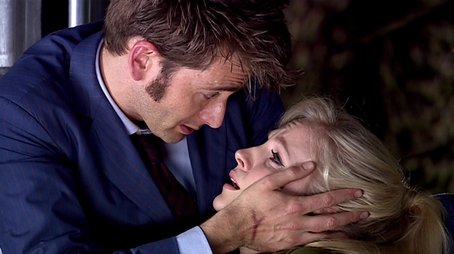
Ask Your Own Question
What is the plot?
The episode begins with the TARDIS materializing in a strange, war-torn environment. The Doctor, played by David Tennant, and his companion Martha Jones, portrayed by Freema Agyeman, step outside to find themselves in a military base on the planet Messaline. They are immediately surrounded by soldiers who are in the midst of a battle. The Doctor is confused and tries to understand the situation, but before he can gather more information, a soldier named General Cobb approaches him, demanding to know who he is.
As the Doctor and Martha are taken into the base, they learn that the planet is in a state of war between two factions: the humans and the Hath, a reptilian species. The soldiers are fighting to protect their territory, and the Doctor is intrigued by the conflict. During this time, the Doctor is brought to a laboratory where a mysterious process is taking place. He is informed that they are about to create a new soldier using his DNA. The Doctor is horrified at the idea of cloning and protests, but the process is already underway.
Suddenly, a bright light engulfs the room, and a young woman emerges from the chamber, fully formed and ready for battle. She is named Jenny, and she is revealed to be the Doctor's daughter, created from his DNA. Jenny, played by Georgia Moffett, possesses many of the Doctor's characteristics, including his intelligence and curiosity. However, she is also a soldier, trained for combat. The Doctor is initially taken aback by her existence and struggles with the implications of having a daughter, especially one created in such a manner.
As the situation escalates, the base comes under attack from the Hath. General Cobb orders the soldiers to defend their position, and chaos ensues. The Doctor, Martha, and Jenny manage to escape the laboratory and join the fight. Jenny quickly proves herself in combat, showcasing her agility and skills. The Doctor is both proud and concerned about her violent tendencies, as he tries to guide her towards a more peaceful approach.
During the battle, the Doctor learns more about the conflict between the humans and the Hath. He discovers that the war has been ongoing for generations, and both sides have suffered heavy losses. The Doctor attempts to broker peace, but Cobb is adamant about continuing the fight, believing that the Hath are a threat to humanity. Meanwhile, Jenny is eager to prove herself and gain her father's approval, leading her to take risks that put her in danger.
As the fighting continues, the Doctor, Martha, and Jenny find themselves trapped in a precarious situation. They are surrounded by Hath soldiers, and the Doctor must think quickly to devise an escape plan. He uses his sonic screwdriver to manipulate the environment, creating a distraction that allows them to flee. During their escape, Jenny is injured, and the Doctor's concern for her well-being deepens.
After regrouping, the Doctor confronts Cobb about the futility of the war. He urges him to consider the possibility of peace and to stop the cycle of violence. Cobb, however, is unwilling to listen and remains focused on defeating the Hath. In a moment of desperation, the Doctor reveals that the Hath are not the monsters they are portrayed to be, but rather a species fighting for their survival. This revelation challenges Cobb's beliefs and forces him to reconsider his actions.
As tensions rise, Jenny takes matters into her own hands. She decides to confront the Hath directly, believing that she can negotiate a truce. The Doctor and Martha follow her, hoping to prevent further bloodshed. When they reach the Hath, Jenny's boldness surprises both the Doctor and the Hath leader. She attempts to communicate and find common ground, but her aggressive approach leads to misunderstandings.
In a climactic moment, Jenny is mortally wounded during a confrontation with the Hath. The Doctor is devastated, realizing that he may lose his daughter before truly getting to know her. In a desperate attempt to save her, he uses a device that can revive her, but it comes with a cost. Jenny is brought back to life, but she is now aware of her own mortality and the implications of her existence as a soldier.
The episode concludes with Jenny deciding to leave the Doctor and Martha to explore the universe on her own. She expresses a desire to find her own identity separate from her father's legacy. The Doctor is left with mixed emotions, proud of her independence but saddened by the distance that now exists between them. As Jenny departs, the Doctor and Martha reflect on the events that transpired, contemplating the nature of family, identity, and the consequences of war.
What is the ending?
At the end of "The Doctor's Daughter," the Doctor, Martha, and Jenny confront the reality of their situation. After a fierce battle, they manage to stop the conflict between the humans and the Hath. Jenny, who is revealed to be the Doctor's genetically engineered daughter, chooses to leave with the Doctor, but ultimately decides to pursue her own path. She takes off in a spaceship, leaving the Doctor and Martha behind. The episode concludes with the Doctor reflecting on the nature of family and the choices that define them.
As the episode nears its conclusion, the tension escalates within the underground base where the Doctor, Martha, and Jenny are trapped. The Doctor, having just discovered that Jenny is his daughter, grapples with the implications of this revelation. He feels a mix of pride and confusion, as he has never had a child before. Jenny, imbued with the Doctor's Time Lord DNA, exhibits remarkable abilities and a fierce determination to fight for what she believes in.
The battle between the humans and the Hath reaches a critical point. The Doctor, using his intelligence and compassion, manages to broker a temporary ceasefire. He realizes that the conflict is rooted in misunderstanding and fear. He urges both sides to see the futility of their war, emphasizing the importance of communication and empathy. The Hath, a race of amphibious beings, are shown to be more than just enemies; they have their own culture and motivations.
As the ceasefire holds, Jenny takes the opportunity to assert her independence. She expresses her desire to explore the universe, feeling a strong pull to carve out her own identity separate from her father. The Doctor, though initially reluctant, understands her need for autonomy. He watches with a mix of admiration and sadness as she prepares to leave. Martha, who has been a steadfast companion throughout their journey, supports Jenny's decision, recognizing the importance of self-discovery.
In a poignant farewell, Jenny boards a spaceship, her eyes filled with determination and excitement for the adventures that lie ahead. The Doctor, standing alongside Martha, feels a profound sense of loss but also pride in Jenny's choice. He acknowledges that she is not just a product of his DNA but a person in her own right, capable of making her own decisions.
As the spaceship departs, the Doctor and Martha are left in the underground base, reflecting on the events that have transpired. The Doctor's expression is a mixture of hope and melancholy, as he contemplates the nature of family and the connections we forge. Martha, ever the supportive friend, reassures him that they will continue their travels together, ready to face whatever challenges await them.
The episode concludes with the Doctor and Martha stepping out into the light, ready to embark on their next adventure, while Jenny soars into the unknown, symbolizing the endless possibilities that lie ahead for all of them.
Is there a post-credit scene?
In "The Doctor's Daughter," there is no post-credit scene. The episode concludes with the Doctor, Donna, and Martha reflecting on the events that transpired, particularly the creation of Jenny, the Doctor's genetically engineered daughter. The focus remains on the emotional weight of their experiences and the implications of Jenny's existence, rather than any additional scenes or teasers after the credits. The episode wraps up with a poignant sense of loss and the complexities of family, leaving viewers to ponder the fate of Jenny as she embarks on her own journey.
What is the significance of Jenny's creation and her relationship with the Doctor?
Jenny is created from the Doctor's DNA, making her a genetic offspring of the Time Lord. This connection leads to a complex relationship where the Doctor grapples with the idea of having a daughter, despite her being a product of a military experiment. Jenny embodies the Doctor's traits, showcasing intelligence, bravery, and a desire for adventure, which creates a poignant dynamic as the Doctor navigates his feelings of paternal instinct and the implications of her existence.
How does the conflict between the humans and the Hath unfold in the episode?
The conflict escalates when the humans, led by General Cobb, are at war with the Hath, a reptilian species. The tension is palpable as both sides are entrenched in a cycle of violence, driven by fear and misunderstanding. The Doctor attempts to mediate, emphasizing the futility of the war, but the situation intensifies when Jenny, embodying both sides' traits, becomes a pivotal figure in bridging the gap between the two factions.
What role does the concept of regeneration play in Jenny's character?
Jenny's character introduces the idea of regeneration in a unique way, as she possesses the ability to heal and recover from fatal injuries, similar to the Doctor's regeneration. This ability is revealed when she is shot, and instead of dying, she recovers, showcasing her resilience. This aspect of her character raises questions about her nature and the potential for her to continue the Doctor's legacy, even as she grapples with her identity and purpose.
How does the Doctor's reaction to Jenny's fate reflect his character development?
The Doctor's reaction to Jenny's fate is one of profound sorrow and regret. When she sacrifices herself to save him and the others, the Doctor is visibly shaken, revealing his deep-seated fears of loss and the consequences of his actions. This moment highlights his struggle with attachment and the pain of losing those he cares about, reinforcing his character's ongoing journey of grappling with the weight of his choices and the lives affected by them.
What is the significance of the setting in the episode, particularly the military base?
The military base serves as a stark backdrop for the episode, symbolizing the themes of conflict and survival. Its sterile, industrial environment contrasts sharply with the emotional turmoil of the characters. The claustrophobic setting amplifies the tension between the humans and the Hath, as well as the urgency of the Doctor's mission to resolve the conflict. The base's isolation also reflects the characters' internal struggles, particularly Jenny's quest for identity and the Doctor's desire to protect those he encounters.
Is this family friendly?
"The Doctor's Daughter" from Doctor Who, Series 4, Episode 6, contains several elements that may be considered potentially objectionable or upsetting for children or sensitive viewers. Here are some aspects to consider:
-
Violence and Combat: The episode features scenes of conflict and battle, including gunfire and physical confrontations. Characters are seen in perilous situations, which may be intense for younger viewers.
-
Death and Sacrifice: Themes of mortality and sacrifice are present, with characters facing life-and-death situations. The emotional weight of these moments may be distressing.
-
Emotional Conflict: The episode explores complex themes of identity and familial relationships, which may evoke strong emotional responses. The character of Jenny grapples with her origins and purpose, leading to moments of existential reflection.
-
Tension and Suspense: There are scenes filled with suspense and tension that may be frightening for younger audiences, particularly during moments of danger.
-
Mature Themes: The concept of cloning and the implications of creating life can introduce mature themes that may require further discussion for younger viewers.
Overall, while the episode is designed for a broad audience, these elements may warrant parental guidance for children or sensitive individuals.











